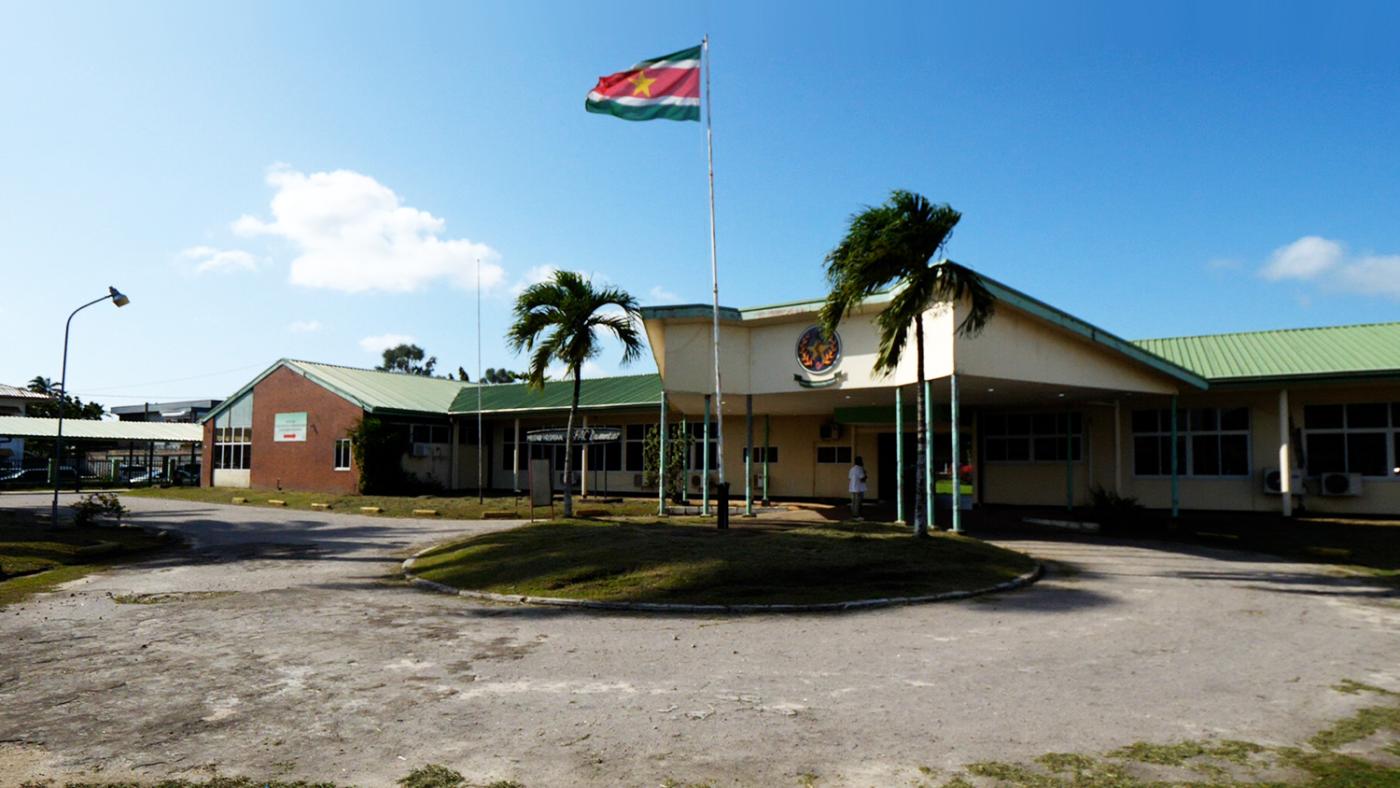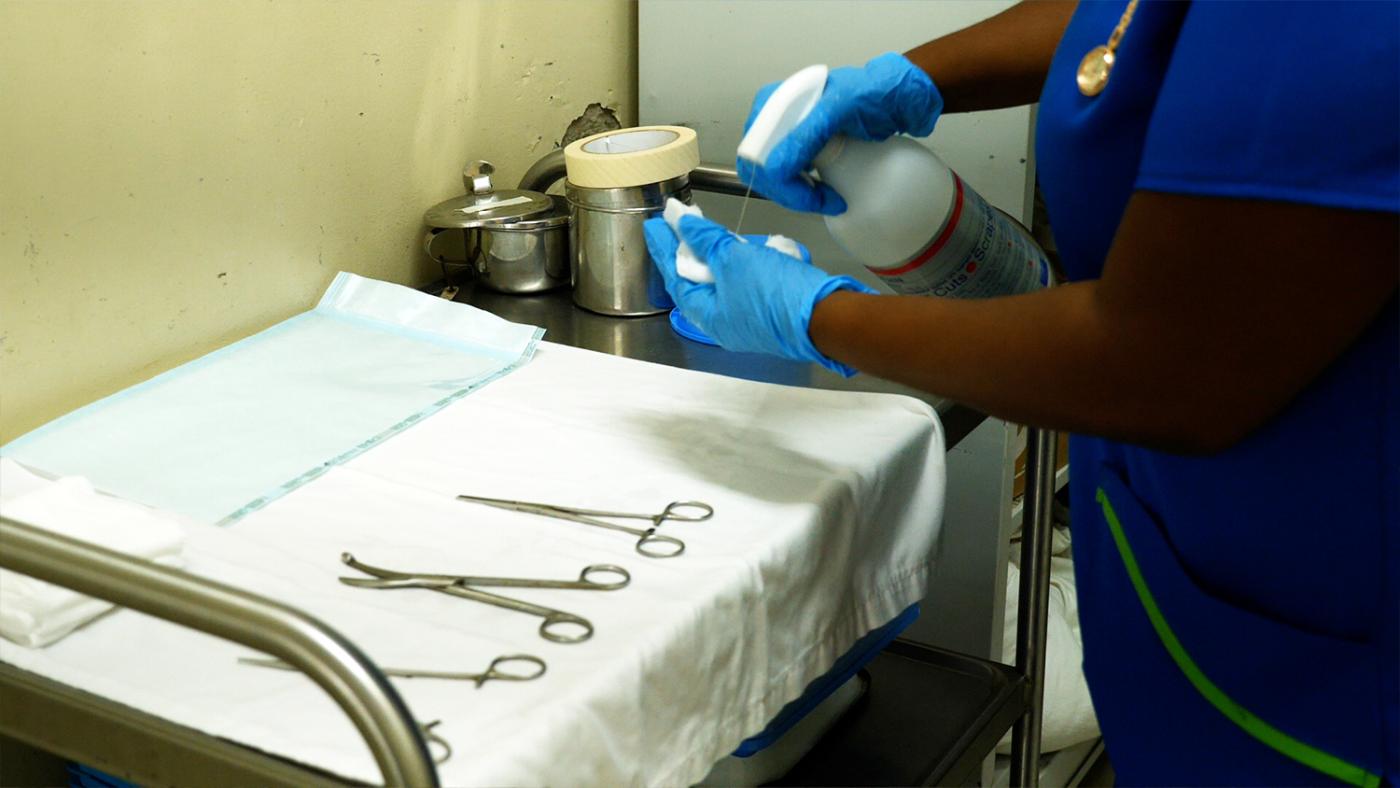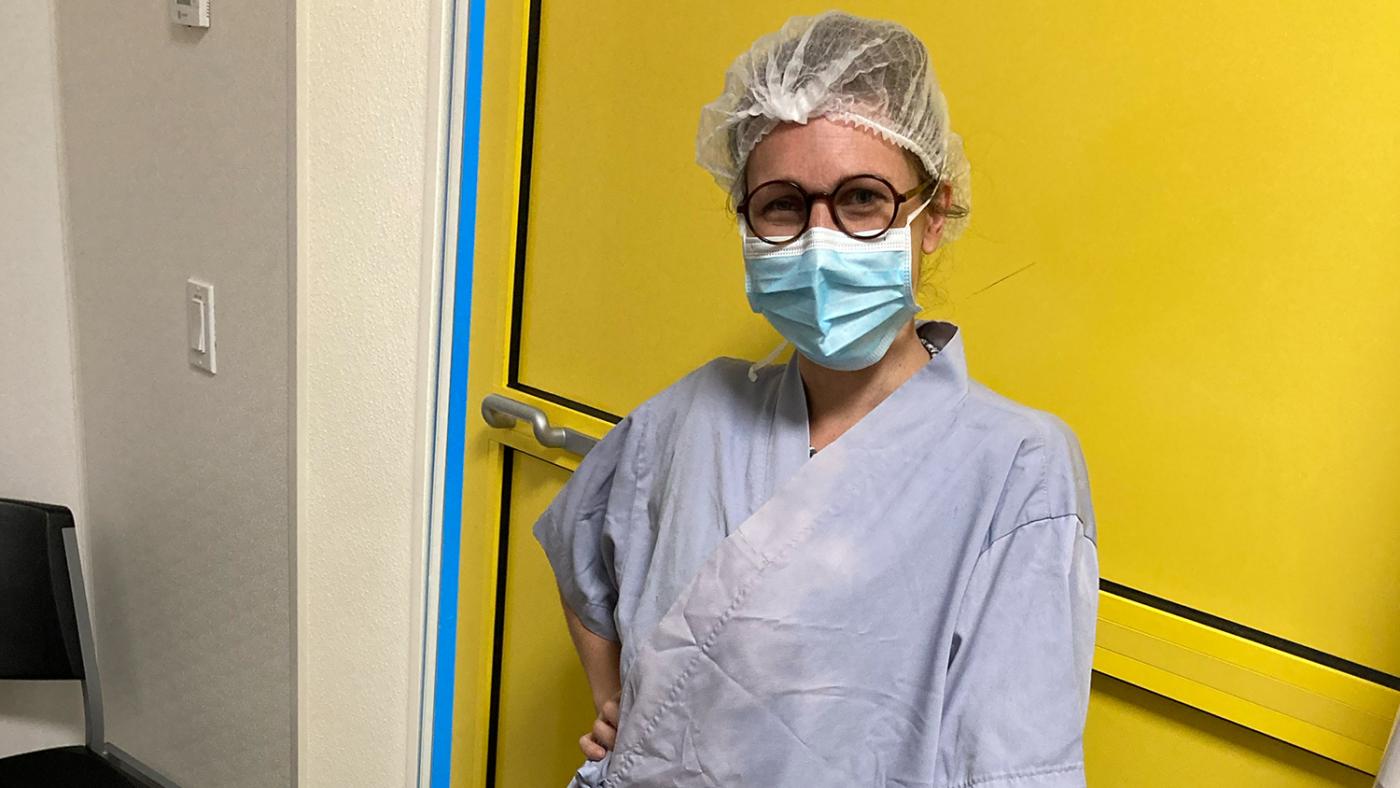Collaboration between UU and the University of Suriname, Anton de Kom:
‘If UU values this partnership, it has a responsibility to support it financially’

In Suriname, hospitals use textiles when delivering babies. Dutch hospitals prefer disposables made of paper. In Suriname, gynaecologists use metal speculums until they break. In the Netherlands, the speculums are often made of plastic. “We use disposables because it’s considered safer and more comfortable for patients, but maybe it’s time to take environmental impact into account as well,” says Megan Milota, Associate Professor of Narrative Medicine at UMC Utrecht.
Milota is in Suriname for five weeks to collect data about the materials used during childbirth and shoot a documentary about the topic. This is part of a research project on circular safe hospitals funded by the EWUU alliance and involving UU, UMC Utrecht, University Anton de Kom, and Academic Hospital Paramaribo (AZP). She will investigate the kinds of products used, how far they have travelled, and to what extent they are reused.
“I’ve noticed so far that they are much more conscious about material use and creative when it comes to reuse. They have great protocols and sterilisation facilities. I also visited their laundry facilities and there is a team repairing things like sheets and jackets with damaged pockets. They don’t throw things away just because they need a little love and care,” she says.
In April, a medical student from Anton de Kom will come to Utrecht to do the same material assessment at UMC Utrecht. The practices of both hospitals will then be compared and, hopefully, the results will help both countries adopt more sustainable practices and reduce costs.

A nurse preparing a reusable childbirth set for sterilisation. Photo: courtesy of Megan Milota
Few obstacles
This project is just one of the ways that UU, UMCU, Anton de Kom and AZP are engaging in a mutually beneficial partnership. Though the collaboration was only formalised in 2021, with a memorandum of understanding (MOU) and a dedicated committee with four people on each side, the cooperation between the two universities goes way back.
“Sometimes, it’s difficult or slow to set up partnerships with universities abroad, but this was not the case,” says Margreet de Lange, Policy Advisor for Global Engagement and chair of the UU committee. Rosita Sobhie, her counterpart at Anton de Kom, says the same: “There are very few obstacles. People just find each other naturally and now their collaboration falls under the partnership.”
This is partly due to a shared history. Suriname was a colony of the Netherlands from 1667 to 1954, so the two countries share a language. Many Dutch people have family members in Suriname and vice versa, and it is not uncommon for Surinamese students to get a degree in the Netherlands and Dutch students to go to Suriname for internships.

Megan Milota in the operating room. Photo: courtesy of the researcher
Immediate path to impact
One of the priorities set by the MOU is capacity building for Anton de Kom University, which is more practically oriented and focused on the Bachelor’s level. Only 15 percent of their staff has a PhD, so UU is helping increase that proportion. A total of 14 staff members from Anton de Kom have since been matched with supervisors to follow a PhD track at UU. They remain employed in Suriname but travel to Utrecht occasionally.
According to Nikki Giron, Programme Manager for International Affairs at UMC Utrecht, increasing the number of academics with PhDs in the Global South “improves their research infrastructure and, once the PhD is granted, the researcher usually ends up in a significant position in the university or the government.”
Joyce Browne, Associate Professor of Global Health and Epidemiology at UMC Utrecht, says the pathway to impact is often more tangible and immediate for Surinamese PhD candidates because they live in a smaller society with a population of less than 650,000 people. “If the right people have the right knowledge, all of a sudden you see a policy implication.”
Lachmi Kodan is an example of this. An obstetrician and gynaecologist, she researched maternal mortality in Suriname for her PhD, whose supervision team included Browne. In 2017, she got a Global Health PhD fellowship from UMC Utrecht to research the topic, setting up registration systems and collecting data to understand why maternal deaths occurred. “Then, we involved all the stakeholders, including policymakers, and did interventions ourselves to improve the quality of care by developing national guidelines and evaluating what these do in practice.”
Brown notes that this is a great example of how someone can use a PhD to scaffold a trajectory to systemically try to improve the systems they live in and address the challenges of those systems through research. Now, Kodan supervises other PhD candidates and is invited every year to give a lecture at the summer school on global maternal, newborn and child health in Utrecht.
A whole new world
“When you obtain a PhD, a whole new world opens up for you,” says Wanda Pherai, Head of Scientific Research at the Anton de Kom’s Faculty of Law. She obtained her PhD in Utrecht in 2019, with a dissertation on the constitutional system of Suriname during the military regime (1980-1987). She was supervised by the former rector Henk Kummeling, himself a constitutional legal scholar. The first chapter of her dissertation was about the democratic constitutional state, so she travelled to Utrecht a few times to gather information.
She says she learned to approach her research topic more objectively in Utrecht. She also benefitted from debates in an international setting. Today, her connection with UU contributes to expanding her network. Through her UU contacts, she has met other lawyers, researchers and members of the Dutch House of Representatives, which comes in handy when devising the curriculum of a Master’s programme, for example.
Pherai explains that it makes a lot of sense for the Netherlands and Suriname to join forces in legal research. Since Suriname used to be a Dutch colony, their law system had to correspond to the Dutch system as much as possible. “We basically have the same laws. When someone writes a thesis or research here, they always compare things to Dutch law. When we have a problem to solve, we can always look at how things are done in the Netherlands because a corresponding law often already exists there. Co-operating in the legal field is therefore a must, and this process can generate knowledge for Suriname as well as the Netherlands.”

Anton de Kom University, in Suriname. Photo: AdekUS website
Cultural awareness
Though the shared past makes collaborations easier, UU researchers and students going to Suriname should bear in mind that this is a colonial past. “If you want the future to be fair and maybe even restorative of past harms, you must recognise the history we stand on,” says Browne.
Sobhie, from Anton de Kom, underscores the importance of bearing economic differences in mind. “There is a constraint in resources and human capital here. Our university is smaller. You are often dependent on a single person, which makes administrative matters take longer.”
According to her, sometimes foreigners with no experience of living in a low or middle-income country expect services in Suriname to be the same way. “You can’t get impatient if the bus is a few minutes late.”
At UMC Utrecht, a programme prepares students for internships in Suriname and other countries from the Global South, ahead of departure. Browne: “We prepare our students to be more culturally sensitive, and also sensitive to different time approaches: some are linear, others are flexible. We also teach our students that some societies are more egalitarian while others are more hierarchical, so people have different ideas about what is considered ‘professional' behaviour. In the Netherlands, medical students are trained to be very proactive and assertive, but this might not be helpful in another context or even be considered rude.”
Assistant Professor Judith van de Kamp is part of the team responsible for this student support programme, which was designed in collaboration with the hospitals where UMC Utrecht students are hosted, including AZP. “We train our students to practice humility, not only to better understand medical and cultural differences but also to increase their ability to value and learn from those differences,” she says.
Equity
Another thing to keep in mind is the importance of equity and reciprocity. While UU can invest in additional learning opportunities for its students, Anton de Kom doesn’t have the same budget or as many sources of funding. “We don’t have enough staff that can help us identify funding opportunities or write proposals. This is where UU can come in because they do have the people,” says Kodan, the gynaecologist.
Currently, more students go to Suriname on exchange or for internships than the other way around. Again, the reason is economic. “Our students can pay for this themselves, but it is not realistic to expect the same from a student from Suriname,” says Browne. For this reason, UMC Utrecht has vouchers for foreign students participating in the summer school on maternal, newborn and child health, for example. It covers travel, accommodation and food costs. “That’s part of equitable thinking.”
Travelling to Utrecht is expensive for the PhD candidates too. UMC Utrecht has a PhD fellowship that can award PhDs from low and middle-income countries (including Suriname) up to 39,000 euros for the duration of the PhD. At the central level, UU used to have a budget of 15,000 euros to help foreign PhD candidates with travel or research costs, but these funds were scrapped in 2025 due to the austerity measures imposed by the Dutch government. It is now up to UU's faculties to support them.
What is in it for us
Margreet De Lange, chair of the cooperation committee, thinks this is a pity: “It’s not acceptable for a university in a very rich country to turn to people who earn 500 euros a month and say: ‘We don’t have any money.’” Browne agrees: “If our university values these global engagement partnerships, it also has a responsibility to support these financially. And that is under pressure now with the impending budget cuts.”
Browne says she understands why people would question UU spending money on this. “We are paid with taxpayers’ money, so we need to be able to justify things.” In her view, scientists must be more articulate about the benefits of this type of partnership for the Netherlands.
When asked, legal scholar Pherai says that the Netherlands could learn from the Surinamese Constitutional Court and legislation on biodiversity, which does not overlap with Dutch law. Sobhie finds that the Netherlands could learn to have a multi-ethnic society in which groups are on a much more equal footing.
Browne gives an example of how the Surinamese approach to diversity can come in handy for the Netherlands: “Here, we say that Diabetes type 2 is more common among ‘people with a Surinamese background’ but things are more specific than that. The highest rates occur among the Indo-Surinamese.” She says that Dutch healthcare sometimes takes ethnic background into account but not always in contexts where it is relevant, which she finds problematic.
“Working with the Global South is not just a way to help the Global South, it benefits our education and the health of our patients. If people understand this, public support will increase,” concludes the medical researcher.
A word from this week's guest editor-in-chief, Henk Kummeling:
This week marks the departure of Rector Henk Kummeling, so DUB invited him to be a guest editor-in-chief for a week. He suggested several themes for in-depth articles, and DUB's editors then delved into them. Kummeling explains his reasoning for suggesting an article about a partnership with the Global South:
'I am very happy that this article is coming out. For years, our universities mostly looked at universities that were similar to ours and judged them based on things we are also questioning now, such as their position on a ranking. Fortunately, we are now coming to different conclusions. If we really want to contribute to solving global problems, we must collaborate with partners in countries where these problems arise or where they are most keenly felt. We also need the knowledge these partners can bring, knowledge that is often gathered, preserved and passed on in a different way than the one we are used to.
This is why we have been partnering up with universities in the Global South more often. One example is our partnership with Anton de Kom University (AdekUS), the only university in Suriname, which is described in this article. Such partnerships are extremely important for many different reasons, including to prepare our students – and where necessary teach them – to be more culturally sensitive.'